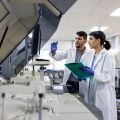
Image credit: Oxford-Harrington Rare Disease Centre
Oxford-Harrington Rare Disease Centre named in first global initiative for children with rare diseases
In the autumn statement on Wednesday 22 November, the government announced its support for the Rare Therapies Launch Pad, a new programme that will develop regulatory pathways for children with rare conditions to access individualised therapies.
The Oxford-Harrington Rare Disease Centre (OHC) in the Department of Paediatrics has a central role in the delivery of this programme, alongside Genomics England, the Association of the British Pharmaceutical Industry and the Medicines and Healthcare Regulatory Agency.
Tens of millions of children globally, including hundreds of thousands in the UK, have rare and life-threatening genetic diseases, with a very small number having access to a treatment. This announcement offers the prospect of change: new individualised therapeutic options are being created but there is currently no route to access these individualised medicines for most patients. The Launch Pad aims to deliver an end-to-end pathway covering diagnosis, the design and rapid manufacturing of these therapies and treatment.
The programme’s first project will explore the use of individualised therapies called antisense oligonucleotides (ASOs) to treat children with ultra-rare and life-threatening brain conditions. This approach has been driven by Julia Vitarello, mother of Mila, and founder of Mila’s Miracle Foundation. Mila was the first person to receive an individualised medicine, an ASO called Milasen, for a condition called Batten’s disease. Longer term, the Rare Therapies Launch Pad will support access to other types of individualised therapies across a wider range of rare conditions, which affect 1 in 17 people globally.
Professor Matthew Wood, Director of the Oxford-Harrington Rare Disease Centre, said: 'The Rare Therapies Launch Pad is a very welcome major advance towards delivering therapies to people with rare genetic diseases. It will put the UK at the forefront of therapeutic and regulatory innovation in this area, building on its global leadership in genomics. The Oxford-Harrington Rare Disease Centre has a mission dedicated to the development of medicines for rare diseases and will play a central role in the Rare Therapies Launch Pad in the discovery and delivery to patients of these new, individualised drugs.'
 Existing hospital analysers offer a low-cost method to screen for fake vaccines
Existing hospital analysers offer a low-cost method to screen for fake vaccines
 Statins do not cause the majority of side effects listed in package leaflets
Statins do not cause the majority of side effects listed in package leaflets